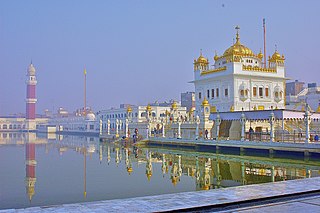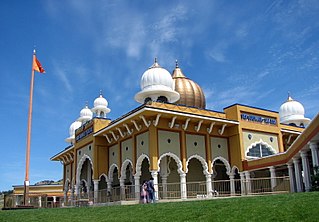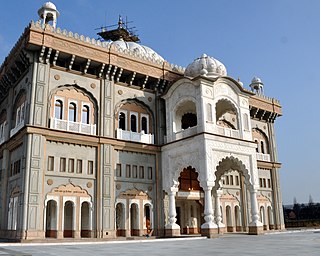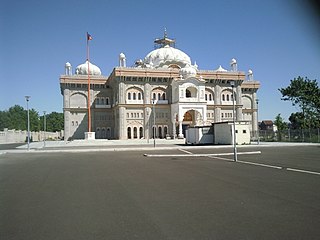
Gurinder Kaur Chadha, is a Kenyan-born British film director of Indian origin. Most of her films explore the lives of Indians living in England. The common theme in her work showcases the trials of Indian women residing in the UK and how they must reconcile their converging traditional and modern cultures. Many of her films address social and emotional issues, especially ones faced by immigrants caught between two worlds.

Gurdwara Sri Tarn Taran Sahib, officially Gurdwara Sri Darbar Sahib, is a gurdwara established by the fifth guru, Guru Arjan Dev, in the city of Tarn Taran Sahib, Punjab, India. The site has the distinction of having the largest sarovar of all the gurdwaras. It is famous for the monthly gathering of pilgrims on the day of Amavas. It is near Harmandir Sahib, Amritsar.

Anandpur Sahib, also referred simply as Anandpur, is a city in Rupnagar district (Ropar), on the edge of Shivalik Hills, in the Indian state of Punjab. Located near the Sutlej River, the city is one of the most sacred religious places in Sikhism, being the place where the last two Sikh Gurus, Guru Tegh Bahadur and Guru Gobind Singh, lived. It is also the place where Guru Gobind Singh founded the Khalsa Panth in 1699. The city is home to Takhat Sri Kesgarh Sahib, the third of the five Takhts in Sikhism.

Fateh Singh, commonly referred to with honorifics as Baba Fateh Singh or Sahibzada Baba Fateh Singh, was the fourth and youngest son of Guru Gobind Singh.

American Sikhs form the country's sixth-largest religious group. While the U.S. Census does not ask about religion, 70,697 Americans declared Sikh as their ethnicity in the 2020 census. The U.S. Census Bureau cites the 2008 American Religious Identification Survey's estimate of the adult Sikh American population at 78,000. The Pew Research Center estimated the Sikh American adult population to be 140,000 and the total population at 200,000 in 2012 while the World Religion Database at Boston University estimated the American Sikh population to be at 280,000 in 2012. Sikh organizations like the Sikh Coalition and American Sikh Congressional Caucus estimate the Sikh American population to be as high as 1,000,000, but do not provide any sources for these figures; 500,000 nevertheless remains the most cited Sikh American population size. With 1% of Asian Americans being Sikh, and 90.7% of Sikh Americans being Asian American, the American Sikh population can be estimated at around 200,000–300,000 in 2021. The largest Sikh populations in the U.S. are found in California (52%), New York (11%), and Washington (6%).

British Sikhs number over 535,000 people and account for 0.8% of the British population as of 2021, forming the United Kingdom's fourth-largest religious group. According to the 2021 United Kingdom census, British Sikhs numbered 535,517, with 520,092 in England, 10,988 in Scotland, 4,048 in Wales, and 389 in Northern Ireland. The largest Sikh populations in the United Kingdom are in the West Midlands and Greater London.
Daljit Singh Shergill, known as Shergill Sahib, was a Sikh leader from Punjab, India, who was president of the first gurdwara in the UK. He immigrated to the West Midlands in the early 1960s. He became president of Guru Nanak Gurdwara Smethwick in 1984 and led the community for 20 years.
The following list consists of concepts that are derived from both Sikh and Indian tradition. The main purpose of this list is to disambiguate multiple spellings, to make note of spellings no longer in use for these concepts, to define the concept in one or two lines, to make it easy for one to find and pin down specific concepts, and to provide a guide to unique concepts of Sikhism all in one place.

French Sikhs are a growing but minority group in France. It is estimated there are about 30,000 Sikhs, most of whom are based in Paris, Bobigny and Île-de-France.

Sikhism in Scotland includes all aspects of Sikh life and Sikhism in Scotland. Sikhs have been present in Scotland for over a century, with the first documented Sikh, Maharaja Daleep Singh, arriving in Perthshire in 1855. The next wave of migration was in early-to-mid 1920s when prominent Sikhs of the Bhat/Bhatra community established themselves in Glasgow and Edinburgh. However, the bulk of Sikhs in Scotland come from families who immigrated during the late 20th century. In Scotland, Sikhs represented about 0.2% of the population (10,988) in the 2022 census.

Guru Nanak Gurdwara Smethwick is a Sikh gurdwara in Smethwick, in Sandwell, near Birmingham in the West Midlands of England. It was established in October 1958 in a former church building which had been bought earlier in the year at a cost of £11,600.

Gurū Nānak, also known as Bābā Nānak, was the founder of Sikhism and is the first of the ten Sikh Gurus. His birth is celebrated as Guru Nanak Gurpurab on Katak Pooranmashi, i.e. October–November.

The Guru Nanak Darbar Gurdwara is a Sikh Gurdwara situated in the town of Gravesend, Kent. It is the largest Gurdwara in Europe and also one of the largest outside India.
Sikhism was founded in Punjab in 1469 by Guru Nanak on the foundations that everyone is equal, regardless of caste, age, or gender. Both men and women are supposed to follow the Five Ks: Kesh, Kangha (comb), Kara, Kachera and Kirpan, and there was never a distinction between what a woman should be allowed to do versus a man at theological level. Men and women are treated equally in the temple (gurdwara), and everyone eats and prays side-by-side. Both men and women are meant to carry the Kirpan with them as they are responsible for their own physical protection, and should not depend on others. Sikhs are strictly against the caste system and many chose to use Kaur or Singh as a last name to push against the problematic caste system in India. There is only one god (Waheguru) in Sikhism and they are without form or gender, and everyone is equal in the eyes of God. Many Sikh women believe that this absence of assignment of code of conduct for a woman versus a man proves that their religion is historically committed to gender equality. Presently, the culture does not always follow these traditions and equality is often more true in ideals rather than daily practice. According to Kiman Kaur: "It is essential to take into account the diverse Kaur narratives in order to critically understand the violence Sikh women experience due to religious, ethnic, and gender minoritization through enabling more intersectional conversations."

Preet Kaur Gill is a British Labour and Co-operative politician who has been Member of Parliament (MP) for Birmingham Edgbaston since 2017. She served as Shadow Minister for Primary Care and Public Health between 6 September 2023 and 4 July 2024.

Sikhism in China is a minority religion in the People's Republic of China. Sikhism originated from the Punjab region of the northern Indian subcontinent.













